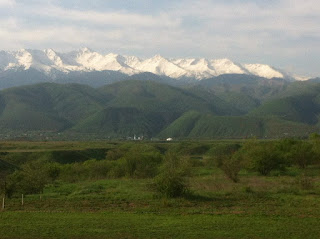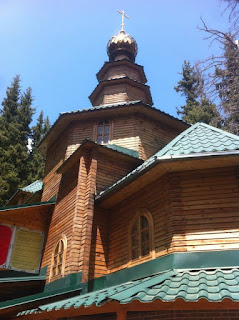People often ask me why I like teaching Middle Schoolers, and beyond my standard answers of "they're so much fun" or a lengthier explanation of how they still have enthusiasm for games but can finally think beyond the concrete, I like to give examples of the kinds of lessons that bring me joy. Such as the one last Friday.
My 8th grade History class is currently in the unit on the early Americas. So far we have covered the Olmec and Zapotec (with hints of the Maya and Aztec to come), and one of the earliest, consistent archaeological findings we have from all four of these cultures is the Mesoamerican ballgame. If you've seen the 2000 movie The Road to El Dorado, you may remember the scene in which this game was featured. In the past, this is the Olmec/Zapotec achievement my students have found most interesting, so I decided this year to make a whole lesson out of it.
First, they spent 20 minutes completing a Webquest, in which I gave them links to a couple of sites and videos. They had to read or listen to the information and pick out the answers to 10 questions I had for them on a worksheet. Once they had finished gathering information, they spent the rest of the 20 minutes designing their personal version of the Mesoamerican ballgame.
Next, I shared with them a version I came up with and brought them out into the hallway where I had set up 2 hula hoops and a rubber ball. In teams of 3, they had 30 seconds to try to score as many points as possible without using their hands or forearms. Honestly, I had no idea how it would go, especially as these particular 8th graders have a reputation of being incredibly competitive. But we had a blast! They cheered for one another, and of course celebrated every one of their own goals.
Following those 15 minutes of play, we returned to the classroom and ended with a discussion on the harsher topic of the Mesoamerican ballgame - whether players were actually sacrificed after a game. And whether those sacrificed players were the losing or the winning team. At one point, when I asked for arguments why some historians believe it could be the winners who were sacrificed, a student raised the idea that sacrifices should be perfect, blameless, the best anyone could offer. Another student chimed in, "Like Jesus was." I practically shouted, "Ooh, yes! Let's talk about THAT for a moment." So we did. And while we could all agree that human sacrifice was a horrendous practice, I think they left the lesson with a slighter higher appreciation for what Jesus accomplished, the most perfect and complete sacrifice in history.
I love Middle School.







